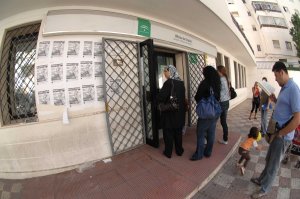More in Marbella are finding work, but still not enough

Job seekers at the Andalusian Employment Service in Marbella.
Jaime Pacheco, a painter by profession, has found a bit of honey on his lips. One year ago, at 44 and after almost half his life adding colour to walls, his work stopped, almost without warning. The slowdown in the construction industry brought a halt to the livelihoods of many painters and workers in other construction sectors. But less than a month ago that trend began to reverse itself. Brushes and buckets began to move again.
That will be good news for everyone like Pacheco in a few weeks or months, but for the short term, it creates a problem: Underemployment. Yes, workers are now finding work when they have had none at all, but it is not enough. The Employment Service cuts aid, but wages for those finding jobs remain too low. As one note posted on the doors of the Andalusian Employment Service laments: ‘I have resumed work, but I only have three months of pay at 600 euros each month’. Dozens of people are coming to the employment office in Marbella expecting a brief respite, but needing more.
For the second consecutive month, unemployment in Marbella has fallen, and is now below 15,000, a level not recorded in the city since late last year. Thus, statistics from the Ministry of Employment say 14,857 people were without a paid occupation at the end of April, 292 less than in March, representing an overall decrease of 1.92 percent in number of unemployed.
The figure is, however, far from a year ago, when the number of unemployed in Marbella amounted to 12,855 people, or 15.57 percent lower than today. “The slightly positive trend experienced in recent months is not enough to overcome the massive job losses suffered by our labour market in the last two years,” says the Secretary of Employment and Trade Union UGT Málaga, María Auxiliadora Jimenez. She is right. Between April 2009 and April 2010, 2,000 workers were to swell the ranks of unemployment with an uncertain future. More distressing still is the picture if we look at numbers going back to 2005, when only the city had only one-third of the unemployed registered today.
‘While recent data are positive, unemployment is not down enough’, Antonio Herrera, secretary general of the CC.OO. union in Málaga, agrees. Herrera attributes this decline to Holy Week, when employment does typically spike. Looking back, he also recognises that unemployment is falling, but insists that the number of those finding work, which primarily reflects the service sector and construction, is still ‘unbearably low’.
The positive trend applies to both men and women, as well. Whereas males have borne the brunt unemployment, the employment gap between the genders has softened. Men were the biggest winners in job recruitment in April, and today there are 7,452 unemployed men compared to 7,405 women.
Given this reality, which continues to shake thousands of families, unions are calling for a change in the production model. ‘It is a fundamental that we create value-added sectors, and establish measures to boost industry, tourism and the agri-food sector,” Jimenez says. For his part, Herrera calls for measures to lay the groundwork for a change in the economic model ‘that requires a full generation of quality employment’.
Disclaimer: The views, opinions and positions expressed within this guest article are those of the author John Grimmett alone and do not represent those of the Marbella Marbella website. The accuracy, completeness and validity of any statements made within this article are not guaranteed. We accept no liability for any errors, omissions or representations. The copyright of this content belongs to John Grimmett and any liability with regards to infringement of intellectual property rights remains with the author.






























